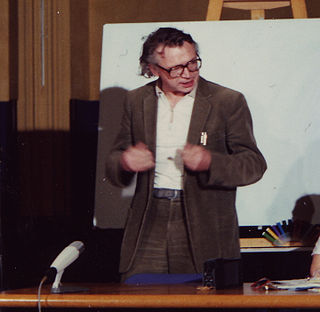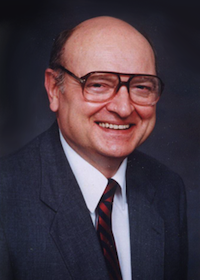Distributism is an economic theory asserting that the world's productive assets should be widely owned rather than concentrated. Developed in the late 19th and early 20th centuries, distributism was based upon Catholic social teaching principles, especially Pope Leo XIII's teachings in his encyclical Rerum novarum (1891) and Pope Pius XI in Quadragesimo anno (1931). It has influenced Anglo Christian Democratic movements, and has been recognized as one of many influences on the social market economy.
The Christian left is a range of Christian political and social movements that largely embrace social justice principles and uphold a social doctrine or social gospel based on their interpretation of the teachings of Christianity. Given the inherent diversity in international political thought, the term Christian left can have different meanings and applications in different countries. While there is much overlap, the Christian left is distinct from liberal Christianity, meaning not all Christian leftists are liberal Christians and vice versa.
The following outline is provided as an overview and topical guide to green politics:
Christian socialism is a religious and political philosophy that blends Christianity and socialism, endorsing socialist economics on the basis of the Bible and the teachings of Jesus. Many Christian socialists believe capitalism to be idolatrous and rooted in the sin of greed. Christian socialists identify the cause of social inequality to be the greed that they associate with capitalism. Christian socialism became a major movement in the United Kingdom beginning in the 19th century. The Christian Socialist Movement, known as Christians on the Left since 2013, is one formal group, as well as a faction of the Labour Party.

Rudolf Bahro was a dissident from East Germany who, since his death, has been recognised as a philosopher, political figure and author. Bahro was a leader of the West German party The Greens, but became disenchanted with its political organization, left the party and explored spiritual approaches to sustainability.
The Social Gospel is a social movement within Protestantism that aims to apply Christian ethics to social problems, especially issues of social justice such as economic inequality, poverty, alcoholism, crime, racial tensions, slums, unclean environment, child labor, lack of unionization, poor schools, and the dangers of war. It was most prominent in the early 20th-century United States and Canada. Theologically, advocates of the movement sought to put into practice the Lord's Prayer : "Thy kingdom come, Thy will be done on earth as it is in heaven". They typically were postmillennialist; that is, they believed the Second Coming could not happen until humankind rid itself of social evils by human effort. The Social Gospel was more popular among clergy than laity. Its leaders were predominantly associated with the liberal wing of the progressive movement and most were theologically liberal, although a few were also conservative when it came to their views on social issues. Important leaders included Richard T. Ely, Josiah Strong, Washington Gladden, and Walter Rauschenbusch.
Robin Eric Hahnel is an American economist and professor emeritus of economics at American University. He was a professor at American University for many years and traveled extensively advising on economic matters all over the world. He is best known for his work on participatory economics with Z Magazine editor Michael Albert.
Progressive Christianity represents a postmodern theological approach, which developed out of the liberal Christianity of the modern era, itself rooted in the Enlightenment's thinking. Progressive Christianity is a postliberal theological movement within Christianity that, in the words of Reverend Roger Wolsey, "seeks to reform the faith via the insights of post-modernism and a reclaiming of the truth beyond the verifiable historicity and factuality of the passages in the Bible by affirming the truths within the stories that may not have actually happened."

James E. Wallis Jr. is an American theologian, writer, teacher and political activist. He is best known as the founder and editor of Sojourners magazine and as the founder of the Washington, D.C.-based Christian community of the same name. In 2021, Wallis joined Georgetown University as the inaugural Archbishop Desmond Tutu Chair in Faith and Justice. He also leads the Center on Faith and Justice at Georgetown. Wallis is known for his advocacy on issues of peace and social justice. Although Wallis actively eschews political labels, he describes himself as an evangelical and is often associated with the evangelical left and the wider Christian left. He worked as a spiritual advisor to President Barack Obama. He is also a leader in the Red-Letter Christian movement.
The Evangelical left is a Christian left movement in Evangelical Christianity that affirms conservative evangelical theology and are politically progressive. It is mainly based in the US, but is also found in Latin America.
The International League of Religious Socialists is an umbrella organization of religious socialist movements in political parties throughout the world. Founded in the 1920s, it has member groups in 20 countries totaling 200,000 members. For most of its history, it was mainly European and contained mainly Christian socialist groups, but has recently expanded to the Americas, Africa, and Australia to include more groups with connections to other religions. It is an associate organisation of Socialist International.
Centesimus annus is an encyclical which was written by Pope John Paul II in 1991 on the hundredth anniversary of Rerum novarum, an encyclical issued by Pope Leo XIII in 1891. It is part of a larger body of writings, known as Catholic social teaching, which trace their origin to Rerum novarum and aim to relate the teachings of Jesus to the industrial age.

The Network of Spiritual Progressives(NSP) is an international political and social justice movement based in the United States that seeks to influence American politics towards more humane, progressive values. The organization also challenges what it perceives as the misuse of religion by political conservatives and the anti-religious attitudes of many liberals. In the international sphere, the NSP seeks to foster inter-religious understanding and work for social justice.

Sojourners is a progressive monthly magazine and daily online publication of the American Christian social justice organization Sojourners, which arose out of the Sojourners Community. It was first published in 1971 under the original title of The Post-American. The magazine and online publication feature reporting, commentary, and analysis on Christianity and politics, the church and social issues, social justice, and Christian living. Articles frequently feature coverage of fair trade, interfaith dialogue, peacemaking, and work to alleviate poverty. The offices of the magazine are in Washington, D.C.
The Sojourners Community is an intentional community that was started in the early 1970s by a group of students at Trinity Evangelical Divinity School. The founders had the desire to further explore the relationship between their orthodox Protestant faith and the social crisis that surrounded them, particularly around the Vietnam War. In the fall of 1971, they began publishing the Post American, a newspaper that expressed the group's commitment to the faith and ideas about social change. The Sojourners Community is most widely known for Sojourners magazine and for the writing and speaking of its founding member Jim Wallis.
Engaged spirituality refers to the beliefs and practices of religious or spiritual people who actively engage in the world in order to transform it in ways consistent with their beliefs.

Eco-socialism is an ideology merging aspects of socialism with that of green politics, ecology and alter-globalization or anti-globalization. Eco-socialists generally believe that the expansion of the capitalist system is the cause of social exclusion, poverty, war and environmental degradation through globalization and imperialism, under the supervision of repressive states and transnational structures.

Ronald H. Nash was a philosophy professor at Reformed Theological Seminary. Nash served as a professor for over 40 years, teaching and writing in the areas of worldview, apologetics, ethics, theology, and history. He is known for his advocacy of Austrian economics, and his criticism of the evangelical left.
The following outline is provided as an overview of and topical guide to socialism:





